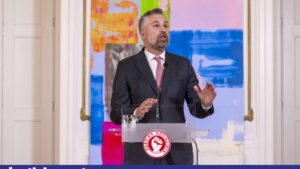CHEGA continues to pursue PM meantime for further clarity on family business interests
The cluster-shambles the government has managed to create around accusations of possible conflicts of interest – particularly concerning changes to the land law – continues today, with right-wing CHEGA ‘demanding’ further clarification from the PM about his family property company, and Justice minister Rita Alarcão Júdice saying the equivalent of ‘what’s mine’s mine, and mine to do what I want with’.
None of the explanations/ retorts coming from the party governing Portugal are falling ‘well’ into the public space: if anything, ministers are simply looking even more arrogant today than they did yesterday.
First, to CHEGA, champing at the bit for ‘full transparency’ (something not yet delivered by the prime minister): the party is asking the Prime Minister for a set of written clarifications on the services and billing of the company he created, Spinumviva, and is threatening to request a parliamentary commission of inquiry if Luís Montenegro does not respond.
“If the Prime Minister does not respond to the questions posed by CHEGA or if they are hidden, the party will consider opening a parliamentary commission of inquiry,” reads a statement released over the weekend.
According to CHEGA, the Prime Minister will be asked today to provide “a written response” to eight questions about the activities of the company Spinumviva, created by Luís Montenegro before he was elected president of the PSD, and later transferred to his wife and the couple’s two children.
CHEGA wants to know whether “the reporting obligations imposed under article 13 of the Law on the Statute of Deputies (in) identifying the public and private legal entities to which services were provided” by this company have been fulfilled and “which clients contracted the services of the company Spinumviva”.
The party also asks Luís Montenegro if “he is in a position to clarify whether or not the contribution obligations arising from the framework of the tax transparency regime for professional law firms were fulfilled, taking into account that there is evidence of the practice of legal consultancy acts”.
“Are you able to clarify the terms under which the legal consultancy services were provided, which, by the way, according to the law on acts specific to lawyers in force at the time, could only be provided by law firms? What services were provided by the company Spinumviva and which entities were involved in Spinumviva’s consultancy contracts?” the document asks.
CHEGA also wants the Prime Minister to clarify “what is the legal validity of the transfer of his shares in Spinumviva to his wife” and what the company’s turnover was.
As has been acknowledged, even by President Marcelo, since CHEGA’s motion of censure against the government failed last Friday, questions have indeed been left unanswered, making it unclear whether or not there are potential conflicts of interest involving Spinumviva and government policies.
CHEGA particularly complains about the prime minister’s refusal to disclose the company’s list of clients – “justifying the decision with the argument of respect for them”. He also “did not clarify details about payments received, services provided and entities involved in Spinumviva’s consultancy contracts”.
The party also points out that several members of the PSD/CDS executive may have real estate holdings (…) Therefore, it is imperative to know when public money is used to make adjustments with people in the family circle or with whom one has business. This is because the (land) law, which aims to make urbanisation of rural land more flexible, raises concerns about the possibility of benefiting companies with direct or indirect links to members of the Government”.
All this leads on to the justice minister, who has shares in no less than four property companies (and declared these holdings to the Transparency Authority long before the changes to the land law became such an issue).
A statement released by the minister’s office yesterday said that “the companies do not have any properties that could benefit from the land law, and there is no conflict of interest”. It also stressed that the justice minister “has no intention of disposing of her personal assets, built with her work and that of her family”.
The statement follows a report by state broadcaster RTP revealing Rita Alarcão Júdice’s stakes in four companies whose corporate purpose is property and tourism.
According to the public broadcaster, the minister “holds half the share of Périplo Essencial, whose area of activity is “Real Estate and Tourism” and of which she was manager practically until she joined the government”, as well as “50% of Pedrasgest”, with the same activity.
The minister also owns “30% of Canforeira – compra e venda de propriedades”, which is active in “real estate”, and 11% of “Stone SPA, whose area of activity is “Beauty Salon and real estate””.
At a time when parliament is discussing changes to Decree-Law 117/2024 of 30 December, which amends the Legal Regime for Territorial Management Instruments (RJIGT) and allows for the reclassification of rustic land into urban land for housing, several government members and MPs have real estate holdings.
This is also the case of labour minister, Maria do Rosário Palma Ramalho, who has a majority stake in a company with her name, with consultancy activities in various areas and “real estate asset management activities”, as well as the minister for territorial cohesion, Manuel Castro Almeida, who oversaw the amendment to the RJIGT, and until a few weeks ago held a stake in a real estate company.
To make matters even more confusing, other MPs, in other parties, are also linked to real estate concerns.
But the bottom line, really, is the fact that parliament (and the wider electorate) is being made to ‘accept’ statements like “there is no conflict of interest”, without being completely satisifed that this is truly the case.
Critics can blame everything on CHEGA, saying the party is simply delighting in making trouble, but is it really ‘enough’ to accept the word of a politician?




















